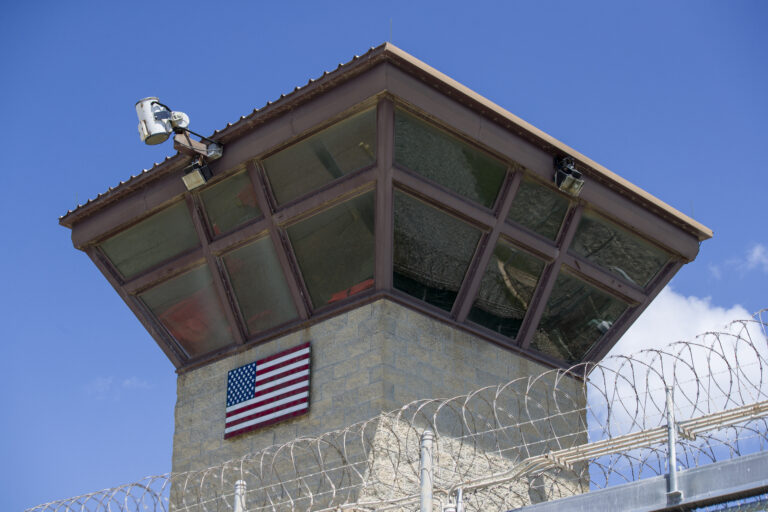

Gitmo to Free Three Al Qaeda Operatives (“Forever Prisoners”) with 9/11, Bin Laden Ties


On the heels of approving a 9/11 Al Qaeda operative’s release, the Department of Defense (DOD) is freeing three more “forever prisoners” with similar credentials from the U.S. military jail in Guantanamo Bay, Cuba. In all four cases, the men were previously denied release by the Military Commission’s parole board, operated by the Obama-created Periodic Review Secretariat (PRS), because they were considered a threat to national security. The about face appears to be part of a Biden administration initiative to clear out the top security facility that houses the world’s most dangerous Islamic terrorists, including 9/11 masterminds Khalid Sheikh Mohammed (KSM), Ramzi Binalshibh, Ali Abdul Aziz Ali, and Mustafa Ahmed Adam al Hawsawi as well as USS Cole bomber Abd al-Rahim al-Nashiri. The prison has around 40 detainees, down from a peak of nearly 700 in 2003.
Judicial Watch covers all the PRS hearings live via satellite video feed at the Pentagon and has traveled repeatedly to Gitmo to observe the military tribunal trials of 9/11 terrorists and al-Nashiri, the USS Cole bomber. Here are the latest developments: Months after clearing Said Salih Said Nashir, the PRS’s Periodic Review Board (PRB) has endorsed the release of Abdul Rabbani Abu Rahmah, Uthman Abd Al Rahim Muhammad Uthman and Saifullah Paracha. Rahman operated safe houses and provided logistical support to most of the 9/11 hijackers, according to his DOD file. He was also directly involved with terrorist plans and operations directed by 9/11 mastermind KSM. “Detainee admitted working directly for Khalid Shaykh Muhammad ISN 010024DP (KU- 10024), as an al-Qaida facilitator from early 2000 to September 2002,” the military file reads. “Detainee’s duties included managing several Karachi, Pakistan (PK), safe houses. Detainee had direct access with many high-level al-Qaida members including Usama Bin Laden (UBL); Ayman al-Zawahiri; Muhammad Atef, aka (Abu Hafs al-Masri); and Nashwan Abd al-Razzaq Abd al-Baqi, aka (Abdul Hadi al-Iraqi).” In his final release determination the parole board writes that Rahmah’s “continued law of war detention is no longer necessary to protect against a continuing significant threat to the security of the United States.”
No further explanation is offered for ending the terrorist’s incarceration after repeatedly denying it. The same applies to Uthman, a former Bin Laden body guard, according to his DOD file. Uthman trained at Al Qaeda’s al-Faruq and Tarnak Farms camps and fought in Afghanistan as a member of Bin Laden’s 55th Arab Brigade, the military document says. A 2016 Guantanamo Detainee Profile reveals that Uthman has “anti-US sentiments and is sympathetic to extremist causes.” The document also states that Uthman received a letter from a former Gitmo detainee suspected of reengaging in terrorist activities. That same year the PRB unanimously denied Uthman’s release, determining that his detention remained necessary to protect against a continuing significant threat to the security of the United States. “In making this determination, the Board considered the detainee’s past involvement in terrorist activities to include receiving combat training, staying in al-Qaeda guesthouses, fighting in the Tora Bora mountains probably against Coalition Forces, and his selection to be a bodyguard for Usama Bin Ladin,” the PRB document reads. The board rejected his release a few more times before mysteriously approving just weeks ago. The language mirrors Rahmah’s final determination and offers no further details for the abrupt change.
Paracha is a Pakistan-based businessman who worked directly with KSM and facilitated senior Al Qaeda leaders and operational planners, according to his Gitmo detainee file. “Paracha’s extensive extremist business contacts that he established before his detention could provide him opportunities to reengage upon release should he choose to use them,” the government document states. Vetoing his release five years ago, the PRB considered Paracha’s “past involvement in terrorist activities, including contacts and activities with Usama Bin Laden, Kahlid Shaykh Muhammad and other senior al-Qaeda members, facilitating financial transactions and travel, and developing media for al-Qaeda.” The board further notes Paracha’s “refusal to take responsibility for his involvement with al-Qaeda, his inability and refusal to distinguish between legitimate and nefarious business contacts, his indifference toward the impact of his prior actions, and his lack of a plan to prevent exposure to avenues of reengagement.” After a handful of denials for release, the board issued a short final determination stating that Paracha’s detention is “no longer necessary to protect against a continuing significant threat to the security of the United States.”
The reality is that a multitude of captives freed from the compound at the U.S. Naval base in southeast Cuba have reengaged in terrorist activity. The Office of the Director of National Intelligence (ODNI) has for years documented it in reports and most recently revealed that of 729 detainees released from Gitmo since the prison opened nearly two decades ago, 125 have been confirmed to reengage in terrorism, though the Defense Intelligence Agency (DIA) and Federal Bureau of Investigation (FBI) put the figure at 130. In its latest update, the ODNI discloses that the whereabouts of 69 former Gitmo detainees that the government is certain returned to terrorism is unknown. “Based on trends identified during the past 17 years, we assess that some detainees currently at GTMO will seek to reengage in terrorist or insurgent activities after they are transferred,” the latest ODNI report states, reiterating language used in past reports.















